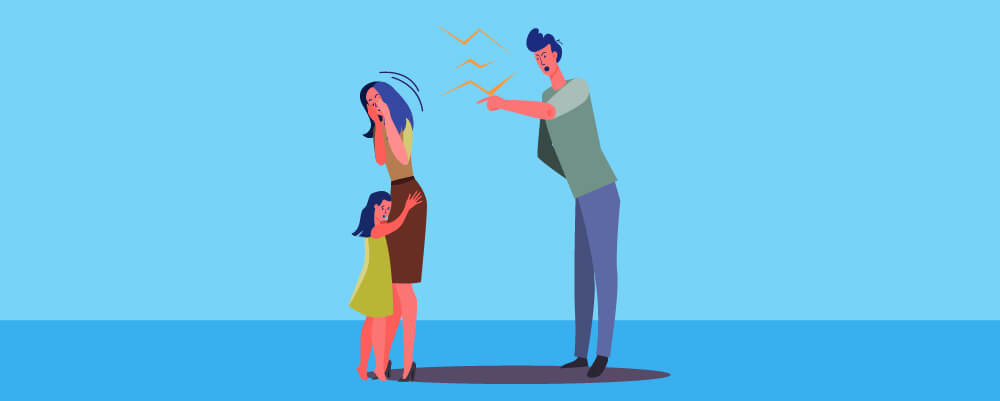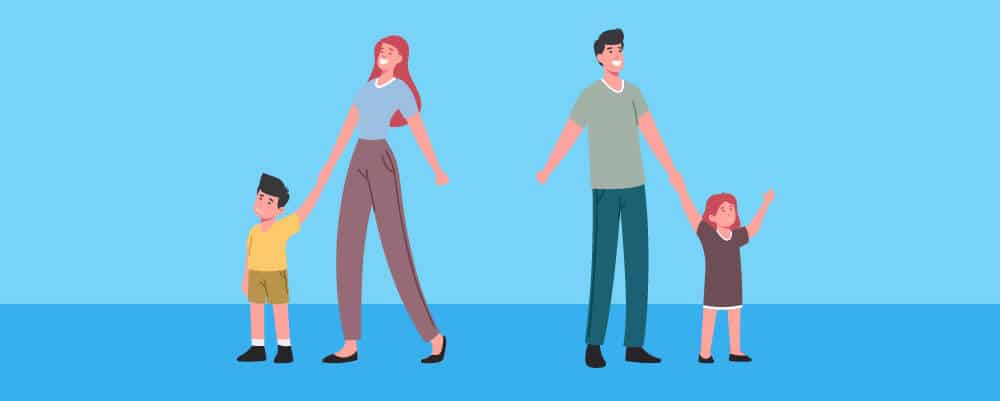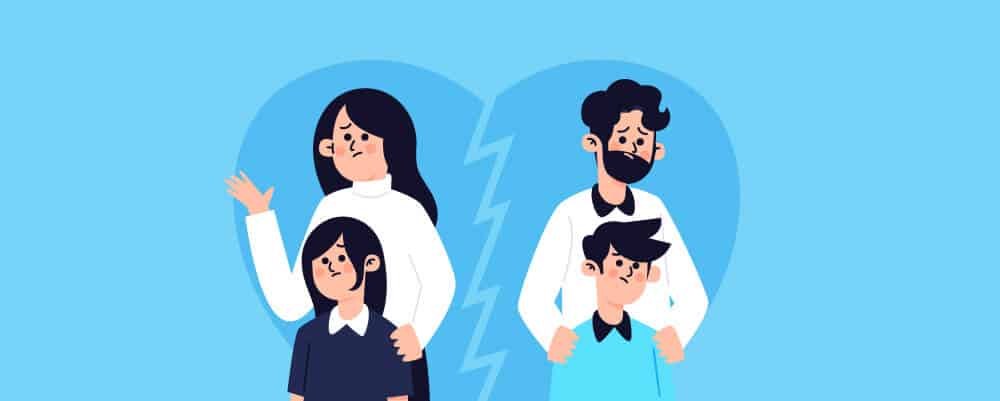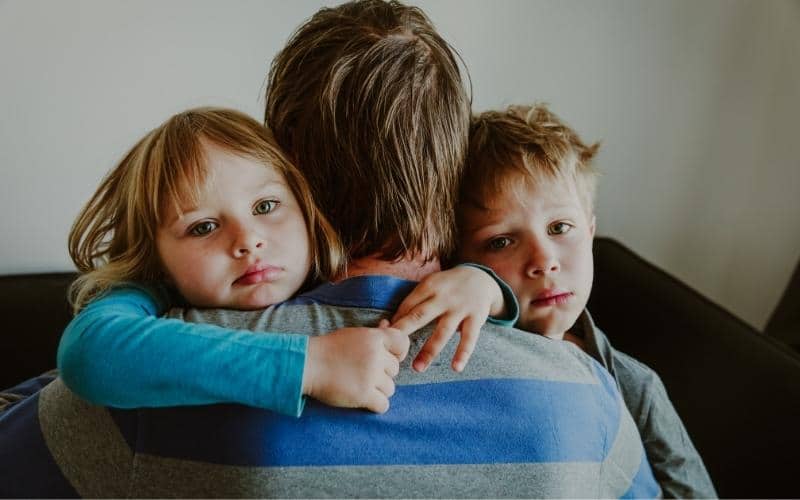Around 876,000 divorces happen every year in America alone. It is something that one in every 4 families will experience in their lifetime. In the USA, the divorce rate for a first marriage is around 41%.
For a second marriage, this goes up to 60% and 73% for a third marriage.
Divorces are more common than most people believe and shouldn't be such a taboo subject. By talking about the process with the people around you, you can make the experience a lot less traumatic. In fact, more and more divorcing couples are looking at amicable, uncontested divorces that qualify for online divorce services where you can eliminate all the friction and save time and money.
Sadly, a divorce, even an amicable one, can have a big impact on the mental health of the children involved. However, there has been a huge amount of research that has been done into these effects and how to help children cope with the situation. You don't have to struggle on your own.
While you won't be able to make the experience pain-free for them, there is a lot that you can do as a parent to reduce the amount of stress and trauma your children go through.
In this guide, you will find advice covering how to notice when your children are struggling and how you can help them.
The Emotional Impact of Divorce on Different Age Groups

Divorce affects each child differently and how intensely they can be affected by the process will depend on a few variables.
However, the age of the child is the most likely to affect how they deal with the divorce. People think divorces are hardest on young children, but they can deeply affect children of any age – even teenagers.
Here is a quick guide to how divorce can affect different age groups.
Young Children
Young children can take divorces very hard. They don't have enough depth of experience to understand what is happening to them and they struggle to rationalize why the changes in their lives are happening.
Moving between two different homes can be tiring for them and without a very strict routine, they can become easily overwhelmed.
They may be so confused by the changes that they think they must have caused their problem. They can blame themselves and worry that their parents are going to stop loving them or they are going to be forgotten entirely. They may become more clingy.
Grade/Secondary school
Slightly older children are more likely to blame themselves for the divorce. They are aware of the concept of consequences and often assume that the sadness they are feeling is happening because they have been bad.
They are more likely to pick up on the way the two parents are acting towards each other and think that they could fix things if they were better behaved. These thoughts can weigh heavily on them.
They are also more likely to notice when they get less attention from their parents – they may be distracted by their own pain. They are also likely to take this change personally.
Teenagers
Any kind of change can be hard for teenagers. With the changes that are happening within their own bodies and all the hormones that are flying around, they can be temperamental anyway.
Teenagers are likely to get angry about the changes that divorce has caused in their lives. They are likely to try and rationalize the situation by blaming one of the parents. They may hold an intense grudge against that parent and may even refuse to spend time with them.
Seeing a 13+ year relationship break up in front of them can be exhausting, frustrating, and heartbreaking for a teenager.
Psychological Effects of Divorce on Families & Children

When you are going through a divorce, it is important that you take the time to check in with how they are feeling and how they feel they are coping with the situation.
They may not always understand what they are feeling or why, but with your guidance, they can deal with these emotions.
Divorce can affect children in many different ways and it is important that you keep an eye out for changes in behavior. Below, we will discuss the 8 most common symptoms children experience when their parents are divorcing.
Mental Health Issues
As we are discovering more about mental health, scientists are learning just how formative our childhood experiences are. Many of us struggle with our identity, race, sexuality, and low moods while we are growing up, and having to navigate a divorce only makes that more complicated.
Studies show that a child's mental health will be affected by a divorce, no matter their age. Rates of depression and anxiety are high in children whose parents are divorced.
Some of the mental health effects caused by divorce will be temporary and the child may be able to work through them on their own. Some, however, may last for longer periods of time and the child may need to talk to a professional about them.
It is important to acknowledge all of the child's feelings as valid during the divorce process so that they feel they can talk to you and so that they don't bottle anything up.
Problems with Behavior
When a child thinks that their bad behavior has led to their parents getting divorced, one of two things usually happens. They will either sink into themselves and become very quiet. Or they may start to believe that there is no point in being good anymore because the worst possible scenario has already happened.
This lack of care about consequences may result in bursts of anger, trouble at school, and sometimes even trouble with the police. They will often act out more when they feel like they are not getting enough attention at home.
They don't know how to express this loneliness in a healthy way and are too embarrassed to talk to their parents about the way they are feeling. This type of behavior can be difficult for both the parents and their other children to deal with.
Poor Academic Performance
It is often said that divorce can really badly affect the academic performance of a child. However, this is not universally true. Children who were expecting their parents to divorce do not see much change in their academic performance.
It has also been noted that some children will throw themselves into their school work and treat it like a safe space away from their turbulent home life.
When the teachers at the school have been properly informed of the child's situation, the child tends to have an easier time at school. Support from teachers, as well as parents, can be invaluable – especially for shy children and children that enjoy their studies.
Being in communication with your child and their teachers about how they feel school is going, will be the easiest way to keep track of this part of your child's life.
Risk-taking Behaviors
One of the most worrying side effects that teenagers experience when their parents are going through a divorce is the tendency to take part in more risky activities. These activities include engaging in sexual activity earlier than average, starting to drink at a younger age, breaking the law more frequently, and drug use.
Reports suggest that children of divorce drink more alcohol, smoke more tobacco and marijuana, and use drugs more than children whose parents are still together.
Another study showed that children whose parents had a messy breakup before they turned 5 were more likely to have sex before they turn 16 than other children. Not living with a father also increased the average number of sexual partners divorced children ended up having once they became sexually active.
Feeling like they lack attention at home and higher rates of depression in children of divorce are believed to make them more likely to take part in risk-taking behaviors.
Emotional Sensitivity and Anger
Adults that are going through divorce end up feeling a whole range of emotions, even if they wanted the divorce most people spend some time grieving the relationship and the changes that are happening in their lives. Children go through a similar process, where they are mourning the breakup of their family unit.
Children can struggle with these emotions as they do not understand where they are coming from or how to process them. This can cause them to get angry and feel more sensitive than usual. They can also find the process frustrating because they feel like they have no control over what is happening to them.
Children who are feeling like this may benefit from talking and writing therapies, as well as being able to talk to their parents and be involved in planning how their new life is structured.
Increased Health Problems
Adults that are going through divorce end up feeling a whole range of emotions, even if they wanted the divorce most people spend some time grieving the relationship and the changes that are happening in their lives. Children go through a similar process, where they are mourning the breakup of their family unit.
Children can struggle with these emotions as they do not understand where they are coming from or how to process them. This can cause them to get angry and feel more sensitive than usual. They can also find the process frustrating because they feel like they have no control over what is happening to them.
Children who are feeling like this may benefit from talking and writing therapies, as well as being able to talk to their parents and be involved in planning how their new life is structured.
Self-Destructive Behavior
When we are upset, we tend to engage in self-destructive behavior – like leaving our work to the last minute or staying up too late. This is something that children will do too.
When you are upset and overwhelmed, being self-destructive can seem like the easiest way to have some control over your life. These activities may be bad for you but at least you have done them on your own terms.
This kind of behavior is often linked with depression (rather than anxiety) and can also manifest itself as an apathetic attitude – i.e “why does it matter if I'm tired, I'm going to be miserable either way.”
Struggling to Adapt to the Changes
Divorce can lead to a great deal of change in a child's life. They may have to move to a new home. They will start seeing their parents less. They may have to change schools. Their routines will change – especially if they are commuting between two homes. There is a lot to deal with, so much that even adults would struggle.
Some children really struggle with the amount of change that they have to go through in a short period of time. They can find it extra frustrating when they have absolutely no control over what is happening and when it is going to happen.
It is not uncommon for children in this situation to become stubborn and emotional. They feel like no one is listening to them and there is no point in them doing anything because the changes are out of their control.
When children are feeling like this, the best thing you can do is to communicate with them openly. You should let them know what is happening well in advance and explain to them exactly why it is happening. It will make it easier for them to process.
Tips for Managing Children During a Divorce

We understand that all parents worry about how their divorce will affect their children, it can be a very stressful time for everyone involved. And the list above is very intimidating. However, we have some good news for you.
Children are resilient and the evidence has shown time and time again that, when they have the right support system around them, a divorce will not permanently affect their lives.
In this section, you will find some tips that will help you to build a good support system for your children during a divorce.
Don’t Put Kids in the Middle
If your divorce has not been amicable then you should try to keep your child out of it as much as possible. Yes, the child is important to both of you and you will want them to have the best life possible, but being caught in the middle of arguments will not help them.
When you are spending time with your child, you should not talk badly about your ex-partner. You should also ask your ex-partner to do the same. At all costs, you want to avoid your child feeling like they are stuck in the middle and that they have to choose a side.
Your child probably won't let on that they feel this way. No child wants to have to pick only one parent and they will not want you to feel like they are a burden because they are upset. They will avoid this even more if they feel like they are responsible for the marriage breaking down.
By agreeing to only speak kindly but truthfully about your ex-partner (even when you don't feel like doing so), you can avoid your child feeling like they are caught in the middle of the war. Showing each other respect will go a long way to improving the quality of your child's life.
Peacefully Co-parenting
Following on from the point above, you should be in agreement with your ex-partner about how your co-parenting is going to work. If your child thinks that you are both in agreement about the situation then they will feel more comfortable in the situation.
If you are constantly telling your child that you want to spend more time with them but their other parents won't let you – your child will start to feel isolated and like they are the one in the wrong. You want to avoid them putting blame on themselves. Make it clear to your child that you both love them and the divorce was not their fault.
You should avoid arguing in front of your child, even if you do disagree with your ex-partner. Instead, present a united front when telling them about any changes that are going to happen. You should also agree on holiday plans far in advance so that your child has time to prepare for the events.
If you are struggling to co-parent peacefully or you feel like the divorce has caused a rift too deep to repair and co-parent then you should consider working with a professional mediator to put your plans together.
Read More: How to co-parent with a narcissist
Maintain Good Relationships
The divorce will affect all of the key relationships in your child's life. You should take the opportunity to deepen your relationship with your child. Maintaining a healthy relationship with your child can improve their chances of having a happier life.
Divorces are painful for the parents as well as the children involved, it can be tempting to close yourself off when you are going through pain. But for the sake of your children, you have to stay in constant open and honest communication with them.
It is okay for you to tell them that you are having a bad day, but you should also let them know that you are not sad because of them. And in return, you should listen to them talk about their feelings and check in with them when they seem upset.
You want to allow them to experience life like a child and not to feel like they are alone or the reason their parents are fighting.
You will want to make sure that your children feel loved but you also don't want to remove all levels of discipline from their lives. Being upset with them when they do wrong is another way of showing that you care.
Use Consistent Discipline
When you start co-parenting for the first time there are a lot of things you will have to agree on in advance. These agreements should include things like how you will discipline your child, their schedule, how you will educate them about growing up and puberty, and if you will be raising them in religion or not.
You may find as time goes on you will have to adapt your approaches to lots of these situations. What is most important is that you are in agreement with each other and co-parent like you are one unit with the same goals.
Perhaps the most important element of your child's life that you need to show a unified front on is how you discipline them. A healthy amount of discipline can improve a child's self-esteem and help them to understand what is expected of them which can make them more secure in who they are.
Having an agreed system of discipline will help to make you and your ex-partner appear more unified. If one of you says yes to drinking and one of you says no then it is just going to drive more of a wedge between the pair of you.
Monitor Teens Closely
If one of your children is in their teens when your divorce starts then you will want to keep an extra close eye on them during the process. As we mentioned above, the process can be particularly difficult for teenagers. If their parents have been together for their whole life and split up then it can have a huge impact on them.
Being a teenager is difficult anyway, their bodies are changing and they are not entirely in control of their emotions. They feel things more intensely than adults do. They are more likely to act out rashly than younger children.
What makes this age group especially important to watch is the fact that they have access to more dangerous substances than the younger members of their families. It is a lot easier for teenagers to get hold of drugs and alcohol than it is for middle graders and teenagers are less likely to listen to the advice of parents when they are told to stay away from them.
You should try to check in with your teenager as often as possible. If you are worried about them then you should send them to see a professional so they can talk through their problems privately and get advice from someone who is qualified.
Empower the Kids
Children spend the majority of their days being taught and bossed around by adults. They never really have to deal with a problem on their own. So, when something like divorce appears in their lives they can feel lost.
They may end up feeling like they don't understand the problems they are facing or how to deal with them. They may also feel like even if they knew what to do, they wouldn't be capable of solving the issue on their own.
Children tend to underestimate themselves, they can deal with a lot more than they think they can. It is your responsibility as a parent to help them to understand what they can cope with and what they will need help with.
When they make the right choices you should be there to praise them, empower them, and remind them how strong they are. Don't be afraid to tell your children that you are proud of them. And, when they make mistakes, be kind to them. Divorces are tough and it will be something that is new to them. Gently point them in the right direction and help if you can.
Teach Kids to Cope
One of your responsibilities as a parent is to teach your children how to cope with the different things life throws at them. You can't always prevent them from feeling pain but you can teach them how to cope with it and carry on afterward.
Divorce can take a huge toll on your children's mental health, so you should teach them some coping mechanisms and ways to look after themselves.
These methods could include teaching them about the importance of exercising and eating healthily. Then doing it with them so they feel supported.
You could encourage them to start journaling. This will allow them to work out what they are feeling and start to deal with it. You could also encourage them to pursue other forms of creative expression like story writing, painting, or making music.
You should also encourage them to speak about their feelings. You can create an environment where they feel comfortable to talk and the people who are listening are taking them seriously.
You should also encourage them to have fun, to spend time with their friends, and to relax. Being overworked or not having time to chill out will only make their problems feel worse.
Seek Education and Ask for Advice
We mentioned at the very start of this article that there has been a lot of research done into how children cope with divorces and how you can make the process easier for them. Thanks to the internet, all this information is at your fingertips (and a lot of it is even in this article).
You are not expected to know how to deal with the situation perfectly on your own without any help. The best thing you can do for your children in this situation is to educate yourself and look into the research that has been done by the experts. And you have already taken the first step by reading this article.
You will find a large amount of information and amazing resources to help you online and the teachers at your kids' schools will also be able to help you with this. You should also take the time to talk to the people in your life who have also gone through a divorce. They will be able to give you some advice on what worked well for them and what didn't.
The more research you do on the topic the more you will be able to find a solution that works for your family.
Get Help from Professionals
Our final piece of advice is to seek out professional help if you are struggling with anything. This could be taking your kids to see a therapist if they are upset. Or bringing in tutors to help them if they are struggling at school. But this also includes talking to therapists if you are struggling emotionally due to the divorce.
Looking after your own mental health is a great way to make sure that your kids have the best experience they can throughout the process. You cannot look after them if you are not able to cope yourself and by looking after your own mental health you are setting a great example for your children – it is okay to ask for help.
Going through a divorce can really take an emotional toll on even the strongest people.
If you are in need of therapy with both privacy and convenience, we recommend Online-Therapy.com. Their incredible service gives you access to instant professional help, on any device, wherever you are in the world.
Summary

With one in four families likely to experience a divorce in their lifetime, divorce is an issue that has, is, and will affect many children across the world.
We understand that many parents will feel overwhelmed by the idea of trying to help their children through this situation. However, research shows that there is a lot that parents can do to reduce the amount of stress their children experience during a divorce.
In the article above, you will find a guide to how to recognize when your children are struggling and how you can help them with the pain they are feeling. It is important to remember that you are not alone in the struggle and there is a lot of research and support out there that can help you.

Lauren Cook-McKay is the Vice President of Marketing at DivorceAnswers.com. She holds a Master’s Degree in Marriage and Family Therapy (MFT) from the University of San Diego and applies her training in private practice to helping couples struggling in their marriage. She believes there is hope in all marriages and strives to provide therapy to couples that will lead them back towards a loving marriage, or an amicable divorce that brings peace and closure.










